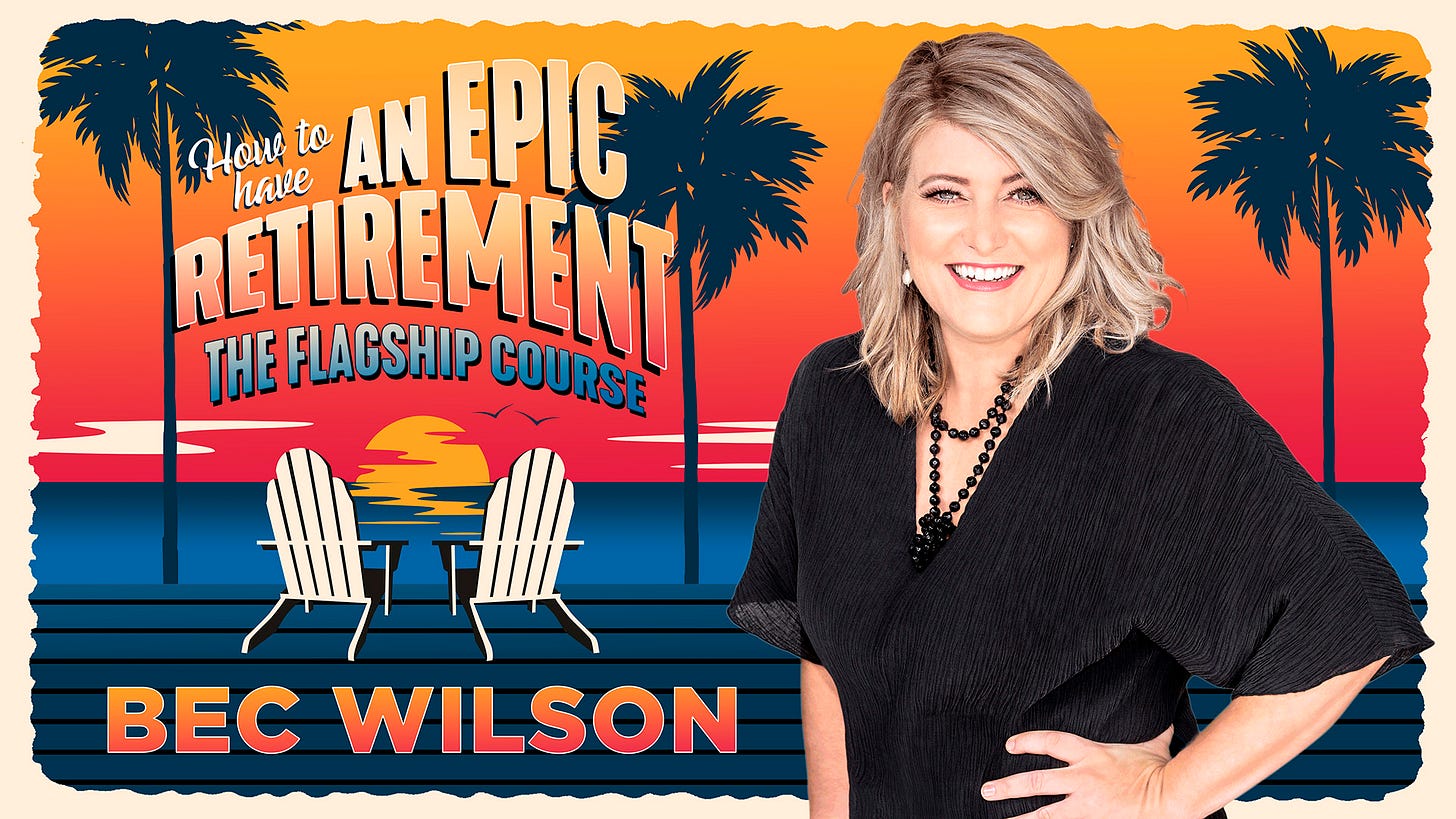You’ll probably live longer than you think, so start planning now
When you really explore your projected lifespan, you might find you’re underestimating the years you have ahead and how much you can do with them.
It’s a bumper edition - everything epic in one newsletter a week from now on. Enjoy! My Sunday Herald/ Sunday Age money section article, a bonus extension to that article about living our longer lives well, this week’s Prime Time podcast and a ‘from Bec’s Desk’ too.
This article was first published on The Sydney Morning Herald, The Age, WA Today or the Brisbane Times here.
It’s interesting to contemplate how long we might live as we head through our midlife and plan for retirement. Not just as a passing thought – but to really think about it. When you do, you might find you’re underestimating the years you have ahead and how much you can do with them.
Life lengths have been changing rapidly. Back in 1970, the average Aussie life expectancy was 71 years. Today, the average life expectancy is 83. If you are approaching midlife and retirement in good health today, that’s likely to improve significantly. But how much longer is the question we all want to answer.
There are some big things to think about when you consider your life length, and use it to set goals and plans for your life ahead. Firstly, which type of life expectancy data will you use to project how long you might live? Secondly, are you likely to live longer than 50 per cent of the population?
The most common numbers we see on life expectancy are those from the Australian Bureau of Statistics’ Life Tables, based on historical data. They tell us the average age people are expected to live based on past experience in the population.
These numbers are interesting, and heavily quoted by the retirement industry, but the reality is, they don’t consider future changes in health and wellbeing, and they don’t consider whether you’ll be one of the lucky ones.
The ABS Life Tables historical data tells us that a 65-year-old man today might live to the age of 85.2 and a woman to about 88.
We need to plan for a longer retirement, both financially and functionally.
As a nation, our health is improving quickly. So, there’s better data to look at if you want to understand how your own life might turn out, particularly if you’re healthier and/or wealthier than average today.
There’s also data publicly available that is adjusted for mortality improvements, that is, they are adjusted to take in potential improvements to our health and wellbeing, given the upward trends in age-of-death rates in the past 25 years.
There’s more… but I can’t fit it all in the email!
Read the whole article here on the Sydney Morning Herald or The Age and find out your adjusted life expectancy for both 65 and 42 year olds. It’s not behind their paywall - but you may have to sign up to view it. It’s also in the print edition today.
So what can you do to make those longer lives better?
If you've read my article in The Age and The Sydney Morning Herald today, you might be wondering what changes could we make to improve our longer lives and make sure we get to live them well? Let’s contemplate it seriously. Here’s my list. Can you add any?
We would clearly look after our bodies better. Exercise, diet, hearing, eyesight, gut health, and brain health will impact how we age physically and mentally, likely improving our quality of life.
Taking proactive steps to prolong our mobility becomes essential. We can replace knees, hips, and shoulders, allowing us to maintain our mobility much later in life. This choice requires an investment of time, effort, and sometimes money, to ensure proper rehabilitation.
Regular healthcare and preventive measures become more critical. Regular check-ups, vaccinations, screenings, and early interventions can help manage chronic conditions and prevent potential health issues.
Mental and emotional health needs more attention. Staying socially active, engaging in intellectually stimulating activities, and seeking help for mental health issues can significantly impact our well-being.
Altering the way we invest, save, and spend our money becomes crucial. A longer life means more years to enjoy leisure activities, as well as more years of general expenses. Budgeting for both might become a higher priority if we believe it's possible.
Lifelong learning and adaptability gain importance. Staying open to new experiences and continuously learning can help us navigate changes and improve our quality of life.
Community and social engagement play a vital role. Being involved in community activities and maintaining a strong social network can provide a sense of purpose and connection.
Financial planning for our ageing years and frailty later in life becomes essential. Having a financial cushion to cover our ageing health and care needs can provide peace of mind.
Valuing our family and friends takes on much greater significance. If we believe our family and true friends will be our anchor in our later years, bringing us joy, we might spend more effort appreciating them now, before we need their company.
Let’s face it, thinking about how long we might live can be confronting or quite exciting, knowing that, to some extent, we have the power to influence our own longevity.
I started this week in Melbourne, speaking at the Boroondara Library to a packed house of 80 people on the coldest night I’ve felt in a long time. Thanks to everyone who came along! There truly wasn’t a spare seat.
Then, it was onto the Australian Shareholders Association (ASA) conference in Melbourne the next day for a really fun panel discussion about modern retirement.
And, then on Wednesday I did a prepared online education session about how to live out longer lives better for the staff at the Australian Prudential Regulation Authority (APRA) the government organisation that regulates our super funds and life insurers. 350 people came along for that one frm all ages - rather a buzz.
Then Thursday we dropped that awesome podcast with Financial Planner Paul Benson - our EOFY Checklist.
And I started finishing off my next speeches as I’m hitting the road down the east coast next week to present for the Fund Executives Association of Australia. Yep! They want to know more about what you want from your funds as you head into retirement. And I’m thrilled to share it so hopefully, they get the retirement phase right for you.
And, throughout the week, our Epic Retirement Club Facebook Group has been going rather nuts!
All this busy-ness has driven me to change the epic retirement emailing schedule. I’m going to do just one, long, valuable weekend emailer for a little while and include everything I do in that one newsletter. And then I’ll see what you think. You’ll still receive the Prime Time podcast newsletter on Thursdays too. Every now and then if something important happens or I get a doozy of a letter, I’ll email midweek, but not every week - only as a special treat.
I’m conscious that the How to Have an Epic Retirement Flagship Course kicks off in just 13 days and that gets all my priority. Our Earlybird 25% off deal closes on the 27th May (MONDAY) at 12 noon, so book now if you want a great deal. I’ll put a more detailed overview of the course below.
And I am gradually chipping away at writing my next book too. A girl can only do so much!
Until next week… make it epic!
Many thanks! Bec Wilson
Author, podcast host, columnist, retirement educator, and guest speaker
Epic Retirement Course Earlybird Deal Ends Monday
The Epic Retirement Flagship Course is booking up beautifully. We have an awesome cohort in the hundreds, booked to kick off on the 6th June. And our guests are ready and raring to go too.
The course includes 8.5 hours of epic retirement education, a signed copy of the book, as well as a new 150 page professionally printed workbook for you too.
We’ve got some amazing live Q&As with some of Australia’s most respected retirement experts, from big companies and small. They include Mark Lapedus from Allianz Retire +, Jen Harding from HESTA, Andrew Lowe from Challenger and David Lane from Ord Minnett. We’ve also go an amazing life coach joining us, Rowena Millward and the amazing travel guru Fiona Dalton too.
So, get your booking in. This is the last chance for these prices for our Winter program. Want to learn more or download a brochure? - you can do that on our website.
The end of financial year is just around the corner, and for those approaching retirement, it can be quite an important time to think about your superannuation contributions and how to maximise your tax savings. This year is also pretty special, because on 1 July we get an uplift in the concessional and non-concessional superannuation caps, an increase in the contribution rate as well as the stage three tax cuts.
LISTEN ON APPLE - LISTEN ON SPOTIFY
So this week I’m chatting with Paul Benson. He’s a Financial Adviser, and a fellow columnist for The Age and The Sydney Morning Herald finance section. And we’re talking through the end of financial year checklist we should all be thinking about before June 30 comes around.













